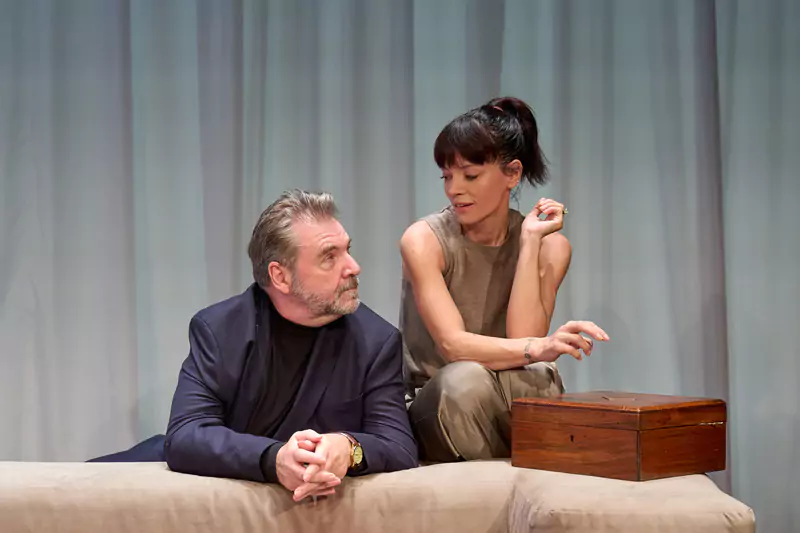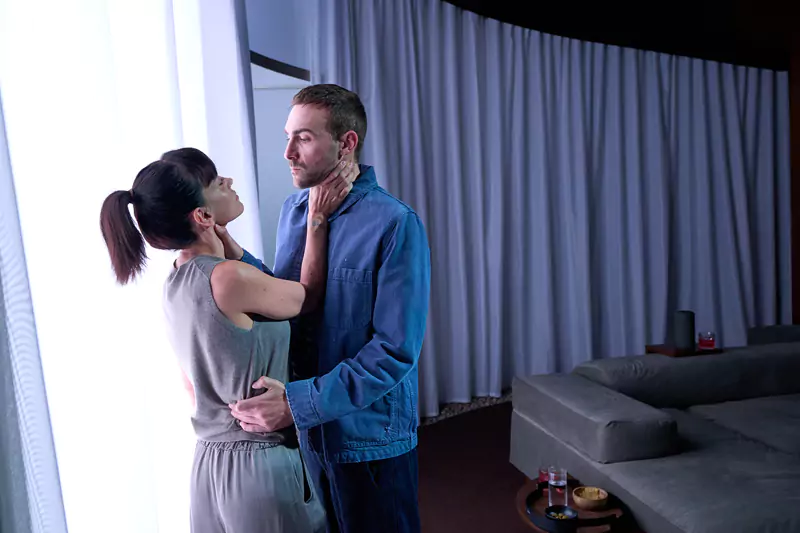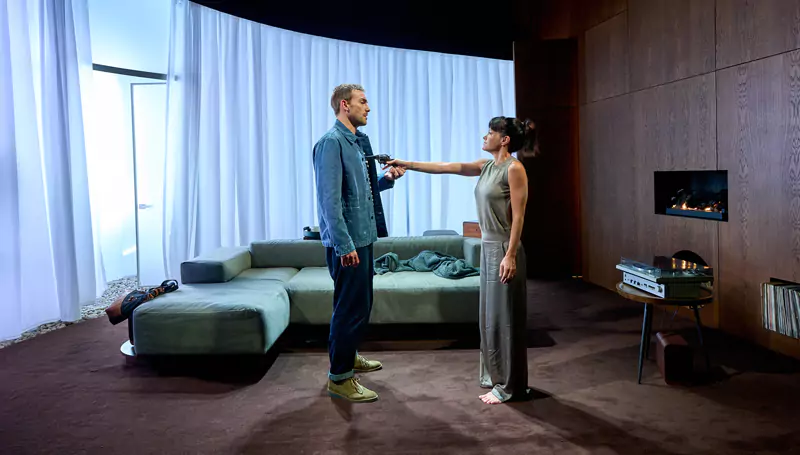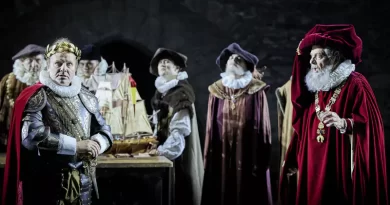“Hedda” at Ustinov Studio, Bath
Simon Thomas in South West England
15 August 2025
★★★★
A “reimagining” of a classic non-English-language play can mean anything from a loosely written script by a writer who knows nothing of the original language to the expressionistic excesses of a full-blown “radical reinterpretation”, such as Ivo van Hove’s Hedda Gabler, which ran at the National Theatre ten years ago. Why is it open season for European writers and yet we still tend to keep native playwrights, such as Shaw and Wilde, intact and untouchable? The term is becoming almost a cliché, as it’s applied to almost any production of a pre-twentieth-century play these days.

Brendan Coyle and Lily Allen.
Photo credit: Manuel Harlan.
Matthew Dunster’s Hedda “reimagines” what is arguably Ibsen’s greatest drama by completely rewriting the text to find contemporary equivalents for every detail in the text. In doing so, it maintains the play’s integrity (something I can attest to, as someone who reads Ibsen in the original Dano-Norsk) and works brilliantly as a contemporary work in its own right. It is perhaps only in the final act, when Ibsen’s tragedy veers towards melodrama, that it betrays its roots. An original modern drama would probably have handled the final scenes very differently.
Dunster’s Hedda is a very good play, although he is of course riding on the coat-tails of a great playwright who gives him everything needed for a riveting evening of theatre. He does more than just not mess up, however, and gives us insights into the work that are not so easily gleaned from the original play. For instance, we get a vivid sense of Tesman’s dilemma, as a young person whose precarious financial position makes getting a mortgage and setting up home a near impossibility without outside help. It’s both relatable to a modern audience and brings a greater sense of reality to Ibsen’s original scenario. Similarly the plight of the young, vain, spoiled woman-child Hedda, who has wilfully got herself trapped in a gilded cage, is both recognizable today and true to the late 19th-century prototype.
A lot of the talk around this production is bound to be about the casting of Lily Allen (whom Dunster directed in The Pillowman in the West End in 2023) in the high-peak role of Hedda, which is coveted by pretty much any classically trained actress. There seems to have been a shift in recent decades away from the disciplines of traditionally classical acting towards a style based on physical and vocal mannerisms, seen almost everywhere now on stage and screen, and Allen exemplifies the trend.

Lily Allen and Tom Austen.
Photo credit: Manuel Harlan.
She’d probably struggle in any venue larger than Bath’s Ustinov Studio, as she gabbles (no pun on the character’s maiden name intended) and swallows her words, in a way that would have the classical purist shuddering. Nevertheless, she’s very natural, and for the most part very truthful, and has an emotional fragility that is ultimately very moving. Perhaps she doesn’t quite have the heft for the character’s final disintegration but it is a believable descent from boredom and frustration into pointless self-destruction.
While doors mysteriously open and close on their own volition, the acting is marked by an adherence to Ibsen’s naturalism and Allen isn’t alone in a lack of clarity of diction and projection. Despite this technicality, Dunster’s direction is meticulous and aids the actors enormously in giving truthful and wholly believable performances. Ciarán Owens is a hapless but sympathetic George Tesman (Ibsen’s equivalent to Flaubert’s decent but dull Charles Bovary) and Brendan Coyle a louche and chilling Brack, here an MP rather than a judge. His shameless suggestion of a threesome is inappropriate enough but his implicit coercive threats at the end of the play are downright evil.
Tom Austen crumbles effectively as the Eilert Løvborg character (here called Jasper), from a wired rant of stark philosophical ideas to the stutters of a wrecked life, spurred on to a pathetic end by Hedda’s misguided idealism. Julia Chan’s messy Taya/Thea is a neatly observed modern take on the ineffectual ex-schoolfriend of Hedda’s, who’s used by pretty much everyone. Imogen Stubbs as George’s slightly bohemian aunt Julia and Nadjla Andrade’s unrooted and directionless nanny/servant, here called Danni, lend strong support.
Dunster sets the play in a presumably English university city and Anna Fleischle provides a simple set suggestive of both social aspiration and, in Hedda’s words, “suburban, bourgeois poverty”. There is a nod towards the play’s origins in the description of (General) Gabler’s antique pistols being Norwegian. Perhaps, according to Chekhov’s maxim, the introduction of guns in the first act means the denouement is obvious but Catherine Jones’s programme essay could have avoided an explicit spoiler about Hedda’s fate for an audience not familiar with the play.
Proving itself once again as a regional powerhouse, Bath’s Theatre Royal provides another evening of riveting theatre that surely deserves a life beyond this four-week run.









